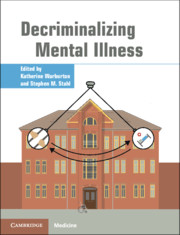Book contents
- Decriminalizing Mental Illness
- Decriminalizing Mental Illness
- Copyright page
- Contents
- Contributors
- Part I Introduction/Description of the Problem
- Part II Solutions
- Part III Psychopharmacological Treatment Considerations
- Part IV Nonpsychopharmacological Treatment Considerations
- Part V Criminal Justice and Social Considerations
- Chapter 28 Tipping the Scales Of Justice: The Role of Forensic Evaluations in the Criminalization of Mental Illness
- Chapter 29 Competence to Stand Trial and Criminalization: An Overview of the Research
- Chapter 30 Risk Factors for Recidivism in Individuals Receiving Community Sentences: A Systematic Review and Meta-Analysis
- Chapter 31 Developing Policies for Adult Sexual Minorities with Mental Health Needs in Secured Settings
- Chapter 32 An Overview of Jail-Based Competency Restoration
- Chapter 33 Fixated Threat Assessment Centres: Preventing Harm and Facilitating Care in Public Figure Threat Cases and Those Thought to Be at Risk of Lone-Actor Grievance-Fuelled Violence
- Chapter 34 Decriminalizing LGBTQ+: Reproducing and Resisting Mental Health Inequities
- Chapter 35 Building a Therapeutic Relationship Between Probation Officers and Probationers with Serious Mental Illnesses
- Chapter 36 Length of Stay for Inpatient Incompetent to Stand Trial (IST) Patients: Importance of Clinical and Demographic Variables
- Chapter 37 Severe Mentally Ill Patients: Our Global Migrants
- Index
- References
Chapter 29 - Competence to Stand Trial and Criminalization: An Overview of the Research
from Part V - Criminal Justice and Social Considerations
Published online by Cambridge University Press: 19 October 2021
- Decriminalizing Mental Illness
- Decriminalizing Mental Illness
- Copyright page
- Contents
- Contributors
- Part I Introduction/Description of the Problem
- Part II Solutions
- Part III Psychopharmacological Treatment Considerations
- Part IV Nonpsychopharmacological Treatment Considerations
- Part V Criminal Justice and Social Considerations
- Chapter 28 Tipping the Scales Of Justice: The Role of Forensic Evaluations in the Criminalization of Mental Illness
- Chapter 29 Competence to Stand Trial and Criminalization: An Overview of the Research
- Chapter 30 Risk Factors for Recidivism in Individuals Receiving Community Sentences: A Systematic Review and Meta-Analysis
- Chapter 31 Developing Policies for Adult Sexual Minorities with Mental Health Needs in Secured Settings
- Chapter 32 An Overview of Jail-Based Competency Restoration
- Chapter 33 Fixated Threat Assessment Centres: Preventing Harm and Facilitating Care in Public Figure Threat Cases and Those Thought to Be at Risk of Lone-Actor Grievance-Fuelled Violence
- Chapter 34 Decriminalizing LGBTQ+: Reproducing and Resisting Mental Health Inequities
- Chapter 35 Building a Therapeutic Relationship Between Probation Officers and Probationers with Serious Mental Illnesses
- Chapter 36 Length of Stay for Inpatient Incompetent to Stand Trial (IST) Patients: Importance of Clinical and Demographic Variables
- Chapter 37 Severe Mentally Ill Patients: Our Global Migrants
- Index
- References
Summary
Beginning in the 1960s, a steady decline in the number of inpatient psychiatric beds has occurred across the United States, primarily as a result of stricter civil commitment criteria and a societal movement toward deinstitutionalization. Concomitant with this decrease in psychiatric beds has been a steady increase in the number of mentally ill individuals who are arrested and processed through the criminal justice system as defendants. One consequence of this has been an explosion in the number of defendants who are referred for evaluations of their present mental state – adjudicative competence – and who are subsequently found incompetent and ordered to complete a period of competency restoration. This explosion has resulted in forensic mental health systems that are overwhelmed by the demand for services and that are unable to meet the needs of these defendants in a timely manner. Defendants with mental health concerns are spending an inordinate amount of time incarcerated while waiting for their competency-related services, resulting in what we refer to as criminalization of individuals with mental illness. In many states, lawsuits have been brought by defendants who have had their liberties restricted as a result of lengthy confinements in jail awaiting forensic services. The stress on state-wide forensic systems has become so widespread that we have nearly reached the level of a national crisis. Many states and national organizations are currently attempting to study these issues and develop creative strategies for relieving this near-national overburdening of forensic mental health systems.
- Type
- Chapter
- Information
- Decriminalizing Mental Illness , pp. 289 - 302Publisher: Cambridge University PressPrint publication year: 2021

